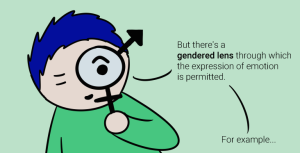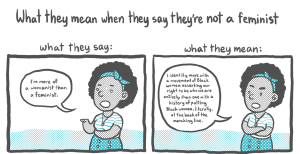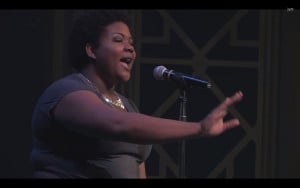
Source: Radio Australia
The Internet is frequently talked about in juxtaposition to the “real” world, as if most of our lives aren’t already an intertwinement of the online and offline.
One of the many unfortunate byproducts of drawing this distinction is that it undermines our thinking of the Internet as a public space.
But the truth is that the Internet is very much a public space – with all of the same sexism, racism, homophobia, and transphobia of our streets, but often, much worse.
Women are the targets of a lot of the ugliness of the Internet.
Not unlike street harassment in the way we feel its hovering, ominous presence and the way it can control our actions — or at least try to — online harassment is an issue to be taken seriously.
The harassment I’ve experienced online has ranged from being told by Twitter egg avatars that I’m possessed by the devil for supporting abortion access, to a group of “men’s rights activists” rounding up as much of my personal information as possible, including things like my mother’s obituary, and writing a series of blog posts about me that were meant to do one thing.
This one thing, the thing all online harassment of women stems from, is the desire to stop women from sharing their opinions and thoughts on the Internet — to chip away at our power and presence in an increasingly important space.
The Mission of Online Harassment
Online harassment and threats against women don’t exist in a vacuum. They have a purpose — to silence women and make us feel unsafe in yet another public space.
And I see signs that it’s working.
The hysteria around keeping girls safe from the dangers of the Internet, or more plainly, policing the way girls and teenagers present themselves on the Internet, is one manifestation.
But the Internet isn’t the problem. And neither are girls or their bodies. Cybersexism is the problem.
The war on women and girls’ participation on the Internet is the digital twin of the gendered violence we experience on the street, in the workplace, and at college parties.
Violence, threats, and harassment targeting women online is real violence because the Internet is a critical and real space. And it feels quite real to those on the receiving end.
It’s not like the harassment and threats don’t trail off of our computer screens. They follow us out the door as we leave our homes as we quietly hope the “manosphere” trolls threatening to track down our addresses weren’t successful in doing so.
That Sounds Familiar: Echoing Rape Culture
The only thing as disturbing as this targeted harassment is the typical response that tends to follow, sometimes even from our own allies — that it’s the price we have to pay for having a public profile, that we just have to grow thicker skin, or that it’s something we should be proud of receiving.
Sounds awfully similar to rape culture’s apologist rhetoric, don’t you think?
As feminist journalist Laurie Penny aptly explained, a woman’s opinion is the miniskirt of the Internet. Here, Penny perfectly captures the shared “asking for it” essence that misinformed, but popular, responses to rape and online harassment have.
Having feminist writing published online shouldn’t be seen as an open invitation for harassment — because it’s not.
And it doesn’t have to be the price we pay for expressing our opinions online.
But… Free Speech!
The funny (not funny at all, but ironic at least) thing is, when feminists and our allies call misogynist trolls and “men’s rights activists” out on their targeted harassment of women online and its larger goal to teach us our ideas and leadership aren’t welcome online, they cry the right to free speech.
But if they were so invested in preserving freedom of speech, I don’t think they would coordinate a massive effort to derail that of the feminist community in online spaces.
It’s not as if these harassers are merely critiquing our writing or thinking process. Any published writer expects and welcomes thoughtful and constructive debate. But this is not the type of exchange myself and countless other women online are experiencing while participating in public discourse online.
No — quite the opposite.
In fact, the actual content of our writing is rarely the subject of online harassment. It is our bodies and sexuality that go under attack — a clear indication that these “men’s rights activists” aren’t at all interested in healthy, respectful debate, or the freedom of speech.
They’re interested in making us feel so uncomfortable and violated online that we’ll quiet our voices on the Internet and stop sponsoring those pesky Change.org petitions.
The Possibility of the Internet
The Internet has immense possibility for both love and abuse. Powerful, meaningful, and very real connections with other people can be made online.
Many people find love online these days — platonic, romantic, and communal. The Internet’s potential for positive community-building and human connection is vast and exciting.
Unfortunately, there is also a lot of power to be potentially abused in sitting anonymously behind a computer screen.
The history of Facebook can certainly tell us something about this.
While popular thought would have you believe that Facebook was born out of the Harvard dorm room of a coding genius with good and nerdy intentions, Laurie Penny explains in Cybersexism: Sex, Gender, and Power on the Internet that Facebook first operated as a site for rating the attractiveness of female Harvard students, whose pictures were posted without their consent.
This first function of Facebook, then called “Facemash,” was inspired by Mark Zuckerberg’s girlfriend breaking up with him and the clothed revenge porn operation he sought to create.
And now Facebook is a digital community most of us are hugely active in — a place for both the best and the worst of the Internet to manifest, the latter making up the site’s roots.
Creating Digital Safety: A Feminist Issue
Shifting online culture to be one in which women can feel safe participating in is a crucial gender equality issue. The imperative to do so is before us.
Upsetting sexist, misogynist norms has to happen here — online — as it does in all other public spaces.
There is legal and political organizing being done to dismantle the culture of online harassment by organizations like Without My Consent, Gender IT, and Take Back the Tech because the truth is that most of our laws haven’t caught up to the Internet’s unique dynamics.
But there are simple things we can do in the meantime to make online communities a safe space for all. Here are a few to get you started:
1. If you see someone being targeted by harassment online, reach out to them and tell them that you’re sorry that it’s happening to them, that they don’t deserve it, and ask if there’s anything you can do to help. A baby animal video can never hurt either!
2. Publicly speak out against online harassment when you see it. Call out the fact that harassment is an abusive attempt to silence women on the Internet. Tweet at or tag the perpetrator directly if you feel comfortable doing so.
3. Leave positive and supportive blog comments. Comments on feminist blogs are notoriously mean, so leave a little love to counter the ignorant bullshit.
4. Report tweets, Facebook comments, and pages if they’re abusive or meant to encourage online harassment.
So what else can we do? What are your ideas for how we can create a safer, healthier space online for women and other marginalized communities?
Want to discuss this further? Login to our online forum and start a post! If you’re not already registered as a forum user, please register first here.
Sara Alcid is a Contributing Writer for Everyday Feminism and is a young feminist living and working in Washington, DC as a reproductive health and justice advocate. Sara loves thinking, reading and writing about the socially and personally transformative power of feminism, queer issues, and women’s health. Follow her on Twitter @SaraAlcid. Read her articles here and book her for speaking engagements here.
Search our 3000+ articles!
Read our articles about:
Our online racial justice training
Used by hundreds of universities, non-profits, and businesses.
Click to learn more




















